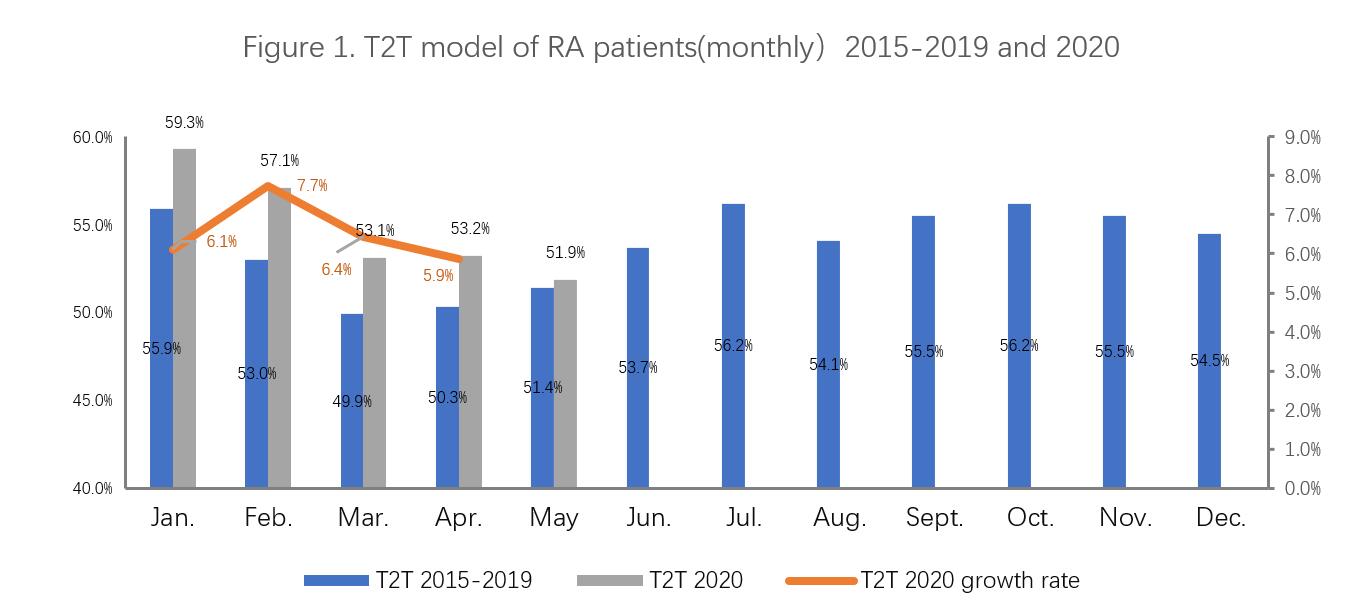Session Information
Date: Sunday, November 8, 2020
Title: Patient Outcomes, Preferences, & Attitudes Poster II: Miscellaneous Rheumatic Diseases
Session Type: Poster Session C
Session Time: 9:00AM-11:00AM
Background/Purpose: Treat-to-target (T2T), achieving a DAS28 below 3.2 is the main management strategy for RA. The Chinese New Year is a long holiday started in Jan. or Feb. based on the lunar calendar. Few clinics were available and most of the patients could returned to their hometown for over a month. The Chinese New Year of 2020 initiated at the end of January, which was overlapped with the quarantine of the COVID-19 epidemic. The whole country was locked down till late of April.
The purpose of this study was to evaluate T2T status of RA patients under double hits by long holiday and COVID-19 lockdown via the Smart System of Disease Management (SSDM).
Methods: SSDM is an interactive mobile disease management tool, including two application systems (APPs) for both doctors and patients. From Jun. 2014 to Jun. 2020, more than 180,000 patients with rheumatic diseases were trained to use SSDM. After executing DAS28 assessment, inputting treatment regiments and lab test records by patients themselves, all data can be synchronized automatically to the authorized physicians’ tool. The doctors can practice online consultation and continue or adjust treatment regiments based on patients’ profile.
Data were extracted from SSDM cloud to develop data analysis model by python software based on data mining since January 2015 to June 10, 2020, and monthly distribution models of the T2T rate were structured. Changes in SSDM online services such as consultation and refilling/adjusting medicines before and during the outbreak were evaluated. Calculations of the monthly average T2T from 2015 to 2019 in spring season, and comparations with the rate of the T2T rate in 2020 were performed.
Results: From June 2014 to June 2019, 56,546 adult RA patients (mean age was 51.35±14.13 years, and median disease duration was 45.97 months) performed self-assessment of DAS28 totally for 127,316 times via SSDM. The T2T rates were the lowest in the year during consecutive 3 months after Chinese New Year eve throughout 2015-2019. In 2020, the country was locked down on January 23, the New Year Eve. Compared with 2019, the T2T rates of RA patients increased significantly by 11.3%, 15.8%, 12.0% and 10.4% from January to April 2020, and was also significantly higher than monthly average rate in same period of 2016-2019. (p<0.01) Fig 1.
During the COVID-19 epidemic, the interactions between doctors and patients via SSDM was increased significantly. SSDM data in holiday-epidemic season showed 628 rheumatologists from 277 hospitals provided 9,924 consultations for 6,041 RA patients. And 407 rheumatologists in 192 hospitals conducted 3,493 refilling/adjusting medications for 2,233 patients. Compared with 2019, the number of consultations has increased by 2.85 times, and the number of medication refill/adjustment had increased by 4.29 times.
Conclusion: The T2T rate of RA patients was lowest in every past Chinese New Year season. During the COVID-19 epidemic, the trend of decline at T2T rates were reversed by strengthen SSDM’s online consultation and continued medication services. Through active interactions between rheumatologists and patients via SSDM, the outcomes were improved and the double hits of Chinese New Year-Epidemic turned out to be a happy accident for Chinese RA patients.
To cite this abstract in AMA style:
Mu R, Li H, Da Z, Huang A, Wang H, Lu J, Wu J, Zhang S, Yu Y, Li C, Li S, Ji P, Wei H, Wu B, Li Z, Shen L, Zhao Y, Zhao Y, Hou X, Xiao H, Jia Y, Wu B, Zhao Y, Chen X, Song M, Xiao F, Li Z. Reversing Seasonal Decline of T2T Outcome in RA Patients Under Double Hits by Chinese New Year and COVID-19 Epidemic via Online Interaction with SSDM [abstract]. Arthritis Rheumatol. 2020; 72 (suppl 10). https://acrabstracts.org/abstract/reversing-seasonal-decline-of-t2t-outcome-in-ra-patients-under-double-hits-by-chinese-new-year-and-covid-19-epidemic-via-online-interaction-with-ssdm/. Accessed .« Back to ACR Convergence 2020
ACR Meeting Abstracts - https://acrabstracts.org/abstract/reversing-seasonal-decline-of-t2t-outcome-in-ra-patients-under-double-hits-by-chinese-new-year-and-covid-19-epidemic-via-online-interaction-with-ssdm/


